
The F. W. Woolworth Company was a retail company and one of the pioneers of the five-and-dime store. It was among the most successful American and international five-and-dime businesses, setting trends and creating the modern retail model that stores follow worldwide today.

A department store is a retail establishment offering a wide range of consumer goods in different areas of the store, each area ("department") specializing in a product category. In modern major cities, the department store made a dramatic appearance in the middle of the 19th century, and permanently reshaped shopping habits, and the definition of service and luxury. Similar developments were under way in London, in Paris and in New York City (Stewart's).

A variety store is a retail store that sells general merchandise, such as apparel, auto parts, dry goods, toys, hardware, furniture, and a selection of groceries. It usually sells them at discounted prices, sometimes at one or several fixed price points, such as one dollar, or historically, five and ten cents. Variety stores, as a category, are different from general merchandise superstores, hypermarkets, warehouse clubs, grocery stores, or department stores.
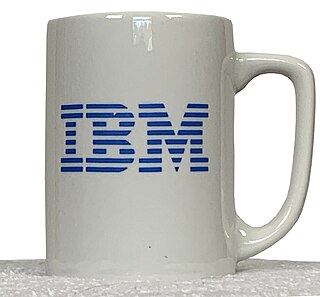
Merchandising is any practice which contributes to the sale of products to a retail consumer. At a retail in-store level, merchandising refers to displaying products that are for sale in a creative way that entices customers to purchase more items or products.
Discount stores offer a retail format in which products are sold at prices that are in principle lower than an actual or supposed "full retail price". Discounters rely on bulk purchasing and efficient distribution to keep down costs.

Caldor, Inc. was a discount department store chain founded in 1951 by husband and wife Carl and Dorothy Bennett. Referred to by many as "the Bloomingdale's of discounting," Caldor grew from a second story "Walk-Up-&-Save" operation in Port Chester, New York, into a regional retailing giant. Its stores were earning over $1 billion in sales by the time Carl Bennett retired in 1985, by which time Caldor was a subsidiary of Associated Dry Goods.

Building #19 was a New England chain of discount closeout retailers that operated from 1964 until it declared bankruptcy in 2013. At the time of its bankruptcy, it had thirteen stores. The family that owned the chain later reopened two of the former locations as a part of a new business, The Rug Department, that was limited to rugs and related merchandise. However, these locations in Norwood and Burlington closed in 2014.
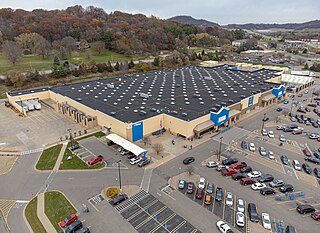
A big-box store, a hyperstore, a supercenter, a superstore, or a megastore is a physically large retail establishment, usually part of a chain of stores. The term sometimes also refers, by extension, to the company that operates the store. The term "big-box" references the typical appearance of buildings occupied by such stores.
Winners Merchants International L.P is a chain of off-price Canadian department stores owned by TJX Companies. Its market niche is similar to the American store TJ Maxx, and it is a partnered retailer to department stores HomeSense and Marshalls.
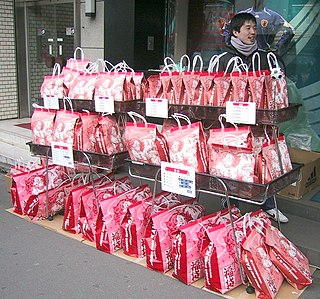
Fukubukuro is a Japanese New Year custom in which merchants make grab bags filled with unknown random contents and sell them for a substantial discount, usually 50% or more off the list price of the items contained within. The low prices are usually done to attract customers to shop at that store during the new year. The term is formed from fuku and fukuro, changing to bukuro for a phenomenon known as rendaku. The fuku comes from the Japanese saying that "there is fortune in leftovers". Popular stores' fukubukuro usually are snapped up quickly by eager customers, with some stores having long lines snake around city blocks hours before the store opens on New Year's Day.
Hutzler's, or Hutzler Brothers Company, was a department store founded in Baltimore by Abraham G. Hutzler (1836–1927) in 1858. From its beginning as a small dry goods store at the corner of Howard and Clay Streets in downtown Baltimore, Hutzler's eventually grew into a chain of 10 department stores, all of which were located in Maryland.
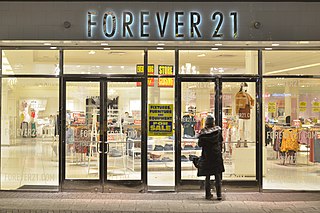
A closeout or clearance sale is a discount sale of inventory either by retail or wholesale. It may be that a product is not selling well, or that the retailer is closing because of relocation, a fire, over-ordering, or especially because of bankruptcy. In the latter case, it is usually known as a going-out-of-business sale or liquidation sale, and is part of the process of liquidation. A hail sale is a closeout at a car dealership after hail damage.
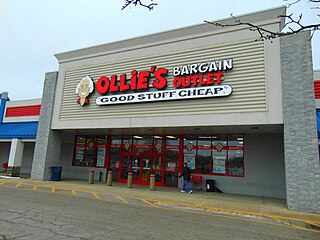
Ollie's Bargain Outlet Holdings, Inc., commonly referred to as Ollie's Bargain Outlet is an American chain of discount closeout retailers. It was founded in Mechanicsburg, Pennsylvania, in 1982 by Morton Bernstein and Mark L. Butler with backing from Harry Coverman and Oliver E. "Ollie" Rosenberg; the latter of whom is the namesake of the company. As of January 2025, the chain has 558 locations in 31 states. Its selection of merchandise comprises a variety of discounted household goods, apparel, pet supplies, kitchen pantry staples, and seasonal products ; a majority of these items are unsold or overstocked merchandise that is purchased in bulk from other retailers and sold at discounted prices.
T.J. Morris Limited is a British variety store chain founded in 1976 by Tom Morris in Liverpool, England, as Home and Bargain.

Once the strategic plan is in place, retail managers turn to the more managerial aspects of planning. A retail mix is devised for the purpose of coordinating day-to-day tactical decisions. The retail marketing mix typically consists of six broad decision layers including product decisions, place decisions, promotion, price, personnel and presentation. The retail mix is loosely based on the marketing mix, but has been expanded and modified in line with the unique needs of the retail context. A number of scholars have argued for an expanded marketing, mix with the inclusion of two new Ps, namely, Personnel and Presentation since these contribute to the customer's unique retail experience and are the principal basis for retail differentiation. Yet other scholars argue that the Retail Format should be included. The modified retail marketing mix that is most commonly cited in textbooks is often called the 6 Ps of retailing.
E. J. Korvette, also known as Korvette’s, was an American chain of discount department stores, founded in 1948 in New York City. It was one of the first department stores to challenge the suggested retail price provisions of anti-discounting statutes. Founded by World War II veteran Eugene Ferkauf and his friend, Joe Zwillenberg, E. J. Korvette did much to define the idea of a discount department store. It displaced earlier five and dime retailers and preceded later discount stores, like Walmart, and warehouse clubs such as Costco.
Harundale Mall, in Glen Burnie, Anne Arundel County, Maryland, United States at the intersection of Ritchie Highway and Aquahart Road, was the first enclosed, air-conditioned mall built east of the Mississippi River.

A second-hand shop is a shop which sells used goods.
Bargain Hunt, formerly Essex Bargain Hunt, is an American discount store chain. Founded in 2004, Bargain Hunt is headquartered in La Vergne, Tennessee with retail locations in Tennessee, Ohio, Indiana, Kentucky, North Carolina, South Carolina, Georgia, Alabama, Mississippi and Arkansas.
The retail format influences the consumer's store choice and addresses the consumer's expectations. At its most basic level, a retail format is a simple marketplace, that is; a location where goods and services are exchanged. In some parts of the world, the retail sector is still dominated by small family-run stores, but large retail chains are increasingly dominating the sector, because they can exert considerable buying power and pass on the savings in the form of lower prices. Many of these large retail chains also produce their own private labels which compete alongside manufacturer brands. Considerable consolidation of retail stores has changed the retail landscape, transferring power away from wholesalers and into the hands of the large retail chains.











